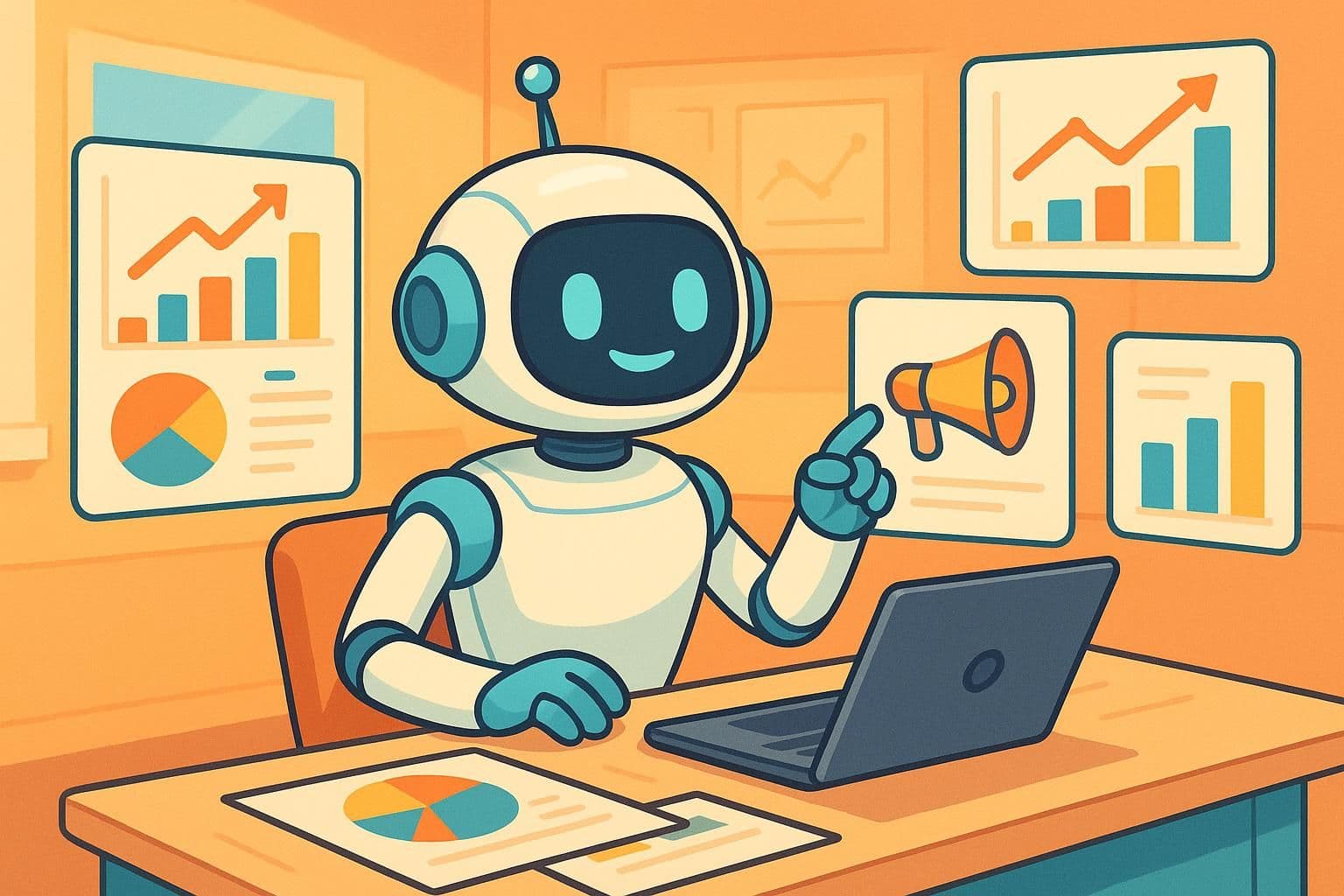AI Marketing Agent: Intelligent Assistants for Marketing Campaigns
Explore how AI marketing agents enhance campaign efficiency, boost revenue, and personalize content, transforming marketing strategies for businesses.

AI marketing agents are changing how businesses run campaigns, helping them save time, personalize content, and boost results. Here’s why they matter:
- Boost Revenue: Companies using AI see up to a 10% revenue increase in the first year.
- Better Targeting: AI segments audiences with precision, increasing email campaign revenue by 760%.
- Save Time: Automate tasks like A/B testing, ad adjustments, and performance tracking.
- Enhanced Content: Generate tailored emails, ads, and social media posts based on real-time data.
Quick Tip: Tools like Latenode make it easy to integrate AI into your marketing workflows, connecting apps like Google Ads, HubSpot, and Mailchimp for seamless automation.
Ready to dive deeper? Let’s explore how AI agents are reshaping marketing.
I Replaced My Entire Marketing Team With AI (Beginners Guide)
Main Features of AI Marketing Agents
AI marketing agents utilize cutting-edge technology to manage campaigns in real time, offering tools that streamline and refine marketing strategies.
Smart Audience Targeting
One of the standout capabilities of AI marketing agents is their ability to process massive amounts of customer data to uncover actionable insights. By doing so, businesses can segment their audiences with remarkable precision. For example, segmented email campaigns have been shown to boost revenue by as much as 760% [2].
The strength of smart targeting lies in AI's ability to:
- Analyze customer behaviors across multiple platforms and touchpoints.
- Detect patterns in large datasets that might go unnoticed by human analysts.
- Automatically update audience segments as new data emerges.
- Anticipate customer preferences and predict future behaviors.
"AI in marketing utilizes algorithms and software to analyze data and make automated decisions that can enhance customer experiences, optimize marketing efforts, and increase the efficiency of campaigns." - Jesse Anglen, Co-Founder & CEO, Rapid Innovation [2]
This level of segmentation ensures campaigns are not only effective but also adaptable to changing audience needs.
AI Content Generation
Creating personalized content is at the heart of effective marketing, and AI agents excel at this by leveraging machine learning. They generate and tailor marketing content based on:
- Previous user interactions on websites.
- Demographic details.
- Audience segment criteria.
- Real-time engagement data.
AI continuously improves its content strategies by analyzing performance data, ensuring that marketing messages stay relevant and engaging over time.
In addition to targeting and content creation, AI offers advanced tools for monitoring and improving campaign performance.
Performance Tracking
AI's ability to process data in real time enables marketers to make swift, informed decisions [3]. Some of the key features include:
- Real-Time Analytics Dashboard: Provides insights into campaign ROI, customer acquisition costs, engagement rates, and conversion metrics.
- Automated A/B Testing: Continuously evaluates elements like email subject lines, ad creatives, landing pages, and audience responses to optimize performance.
- Automated Alerts: Flags important events such as unexpected traffic spikes, performance dips, budget thresholds, or unusual engagement patterns.
Real-world examples highlight the impact of these capabilities. Amazon, for instance, used AI-powered analytics and personalization to achieve a 30% sales increase. Similarly, Coca-Cola's use of AI for social media automation cut manual work by 40% while improving engagement by 25% [1].
These features work together to create a dynamic system that continually improves marketing effectiveness through learning and adaptation.
Creating Marketing Agents in Latenode
Latenode provides a straightforward platform for designing intelligent marketing workflows that combine visual ease with advanced AI capabilities. If you're looking to streamline your marketing strategies, here's how you can use Latenode to set up and enhance your marketing agents.
Latenode Setup Guide
Getting started with Latenode is simple and intuitive. Follow these steps to begin:
- Create your workspace: Sign up for a 14-day free trial to explore its features.
- Access the visual workflow builder: Choose whether to start from scratch or use a pre-built template.
- Set up triggers: Define actions like form submissions, email opens, or payment confirmations to kick off your workflows.
Once your workflow is configured, the next step is to integrate your essential marketing tools for smooth automation.
Connecting Marketing Tools
Latenode supports integration with over 300 marketing apps, ensuring compatibility with the tools you already use. Key integrations include:
- Google Ads: Uses OAuth authentication for secure access.
- Mailchimp: Connect with API keys.
- HubSpot: Authenticate using API tokens.
All API connections and credentials are encrypted by Latenode, ensuring your marketing data remains secure while enabling automated data flow between platforms. After connecting your tools, you can enhance your workflows by incorporating AI-driven features.
Adding AI Capabilities
AI can elevate your marketing workflows by enabling smarter decisions and generating dynamic content. Latenode simplifies this process with its AI nodes, which natively support various AI models.
Key AI Applications:
- Content Creation: Link your CMS to OpenAI's GPT models to automate tasks like generating email subject lines, social media posts, and ad copy variations.
- Audience Insights: Leverage customer data with AI models to predict engagement, estimate lifetime value, and identify promising leads.
- Campaign Adjustments: Use AI to fine-tune ad budgets, optimize email send times, and refine audience segments based on performance metrics.
For instance, one user highlighted how Latenode's AI Nodes make integration easy by allowing direct calls to AI models using Latenode credits [4].
To ensure your workflows perform as expected, regularly test them using Latenode's debugging tools. This helps maintain efficiency and accuracy in your marketing automation.
sbb-itb-23997f1
Marketing Automation Examples
Latenode's integration capabilities simplify and enhance marketing processes, making them more efficient and impactful. Below are some practical examples showcasing how Latenode can reshape marketing strategies.
Lead Nurturing Systems
A contract automation firm revamped its lead generation process by leveraging Latenode's workflow automation. By connecting tools like Leadfeeder for discovering new contacts, Apollo for enriching data, and Instantly for executing email campaigns, the company achieved impressive results:
- Qualified leads increased by 62% (from 500 to 810 per month)
- Lead engagement jumped by 45% (from 20% to 29%)
- Conversion rates rose 40% (from 5% to 7%)
- Personalized communications grew from 20% to 50%
- Response time dropped by 80% (from 24 hours to just 4.8 hours)
These improvements highlight how Latenode's automation can streamline essential marketing tasks, saving time while boosting effectiveness.
Ad Campaign Management
Through Latenode's integration with Google Ads, marketers can automate and optimize ad campaigns with ease. This AI-driven system allows teams to:
- Monitor performance metrics in real time
- Adjust bidding strategies based on live data
- Sync lead details with CRM platforms
- Generate detailed performance reports
For instance, when a lead converts via Google Ads, Latenode can automatically create a deal in Pipedrive, initiate a personalized email sequence in Mailchimp, and update analytics in Google Sheets [5]. This ensures smooth data flow and consistent tracking of leads, helping marketers stay on top of their campaigns without manual intervention.
Social Media Automation
Latenode also powers smarter social media management by automating key tasks. Marky, a social media marketing tool integrated with Latenode, has reported that AI-generated posts achieve 3.4 times higher engagement compared to industry benchmarks [6].
Christine Price, a business owner at Laser Life Outdoors, shared: "After years of a total hatred for social media posting, I've landed on Marky and couldn't be happier. Now I don't dread social media posting - I look forward to it because they do all the heavy lifting" [6].
With Latenode, businesses can:
- Schedule posts across various social platforms
- Track engagement metrics in real time
- Use AI to craft optimized responses to comments
- Develop data-driven content strategies
These capabilities not only save time but also enhance engagement, allowing businesses to focus on creating meaningful connections with their audience.
Implementation Guidelines
Deploying AI in marketing requires a careful balance of rigorous testing, strong security measures, and ongoing performance reviews. While 54% of companies now use conversational AI in their marketing efforts, a staggering 97% have faced security-related challenges [8]. Below are actionable steps to ensure success.
Testing New Workflows
Thorough testing is critical to avoid errors and ensure smooth operations. A structured approach can help:
- Start with Sandbox Testing
Use a controlled environment with sample data to simulate real-world conditions while minimizing risks. - Implement A/B Testing
Compare automated workflows against manual ones to identify strengths and weaknesses. Track metrics like response times, engagement rates, and conversion accuracy to refine processes. - Gradual Rollout
Introduce new workflows to a small segment of your audience - around 10–15% - and expand based on performance results. This phased approach reduces risks during implementation.
Once workflows are validated, the focus shifts to safeguarding data.
Data Security Standards
As AI becomes more integral to marketing, protecting customer data is non-negotiable. Organizations must adopt comprehensive security measures to maintain compliance and trust:
- Encryption Requirements
Ensure all data is encrypted both at rest and during transmission [8]. - Access Controls
Implement role-based access control (RBAC) to limit system access to authorized personnel. - GDPR Compliance
Conduct Data Protection Impact Assessments (DPIAs) for high-risk processes to meet regulatory requirements [9]. - Data Minimization
Only collect and process information that is absolutely necessary for your marketing objectives. - Audit Trails
Maintain detailed logs to track AI system actions and data access, ensuring accountability.
"Generative AI offers transformative potential, but it requires careful handling to align with GDPR. By embedding privacy-by-design principles, ensuring transparency, and proactively managing risks, businesses can leverage generative AI responsibly while maintaining compliance." - CYTRIO [7]
Performance Optimization
Even after deployment, ongoing performance reviews are essential to keep AI systems effective. Regularly monitor metrics such as engagement, response accuracy, conversions, and system response times. A consistent review schedule - weekly for engagement, monthly for deeper analyses, and quarterly for strategic adjustments - can make a big difference.
Strategies for optimization include:
- Fine-tuning AI models with fresh campaign data
- Adjusting targeting settings based on performance insights
- Updating content templates to reflect what resonates most with your audience
- Streamlining workflow sequences to improve efficiency
Ignoring data protection regulations can lead to severe penalties [8]. By combining careful testing, robust security practices, and continuous optimization, businesses can maximize the potential of AI in marketing while minimizing risks.
Next Steps
AI marketing is proving its worth by delivering measurable results, making this the perfect moment to act on these insights. Companies adopting AI are uncovering new ways to enhance their marketing strategies and achieve outstanding outcomes.
AI Marketing Benefits
The impact of AI in marketing is evident in real-world examples. Take Klarna, a global payments leader, which achieved impressive milestones in Q1 2024 by integrating AI into its marketing processes:
- Cut marketing expenses by 11% while boosting campaign output
- Reduced image development timelines from 6 weeks to just 7 days
- Saved $10 million annually through AI-driven efficiencies
- Automated 80% of copywriting tasks using generative AI [10]
"AI is helping us become leaner, faster and more responsive to what our customers care about, leading to a much, much better experience." – David Sandström, Klarna's CMO [10]
Similarly, RedBalloon, a prominent experience gifting company, saw a dramatic transformation in its digital marketing:
- Achieved a 1,100% average return on ad spend
- Lowered marketing costs by 25%
- Identified untapped customer segments
- Improved campaign performance by at least 30% [11]
These examples highlight how AI can revolutionize marketing efforts, making it a powerful tool for businesses of all sizes. With these benefits in mind, let’s explore how you can take advantage of AI using Latenode.
Start Using Latenode
Latenode makes it easy to kickstart AI-driven marketing automation, delivering scalable results without complexity. Here’s how to get started:
- Assessment and Planning
- Begin with a thorough review of your marketing processes to pinpoint repetitive tasks suitable for automation.
- Prioritize areas with the highest potential impact, such as content creation, campaign management, and performance tracking.
- Implementation Strategy
- Use Latenode’s intuitive visual builder to create your first workflows.
- Start small by automating one marketing channel to establish a strong foundation for scaling.
- Leverage Latenode’s 300+ integrations to connect the tools you already use.
- Optimization and Scaling
- Track performance using Latenode’s analytics to measure success.
- Continuously refine workflows based on real-time insights.
- Gradually expand your automation efforts as initial results confirm effectiveness.
"The real competitive advantage isn't in which AI you use - it's in how you organize and leverage your company's unique intellectual capital." – Tim Hickle, Fractional CMO [12]
FAQs
How can AI marketing agents improve audience targeting and segmentation?
AI marketing agents have transformed the way businesses approach audience targeting and segmentation. By analyzing vast amounts of data, they identify patterns and build detailed customer profiles. Unlike older methods, these agents work with real-time data, anticipate customer behaviors, and adjust audience segments dynamically. This ensures that marketing strategies stay relevant and personalized.
Using predictive analytics and behavioral insights, these tools empower marketers to craft campaigns that connect with their intended audiences more effectively. The result is improved engagement, stronger performance, and a noticeable boost in ROI - all while making marketing efforts more efficient.
How can companies ensure data security when using AI in their marketing strategies?
To protect sensitive information while incorporating AI into marketing efforts, businesses should prioritize several key security measures. Start with robust access controls, data encryption, and policies that limit unnecessary data collection. These steps create a strong foundation for safeguarding critical data. It's also essential to adopt a privacy-first design mindset and adhere to global regulations like GDPR or CCPA to ensure legal compliance.
Employee education plays a vital role as well. Training staff on best practices for data security helps reduce risks tied to human error. Additionally, maintaining accurate and well-managed datasets minimizes vulnerabilities. Regularly revisiting and refining security protocols, setting clear boundaries for data usage, and having a plan in place for managing changes to sensitive information further strengthen your defenses. By focusing on these strategies, companies can protect customer trust and ensure their AI-driven marketing practices remain secure.
Can AI marketing tools completely handle content creation, or do marketers still need to review and refine the output?
AI marketing tools excel in tasks such as automating data analysis, pinpointing target audiences, and producing content on a large scale. Despite these strengths, they fall short when it comes to creativity, emotional understanding, and the kind of strategic thinking that only human marketers can provide.
To achieve the best outcomes, blending AI's efficiency with human expertise is key. While AI can manage repetitive tasks and offer insights based on data, marketers play a crucial role in refining this output. By ensuring it aligns with the brand's voice, connects with the audience, and maintains high-quality standards, human oversight transforms AI-generated work into impactful marketing.
Related posts



